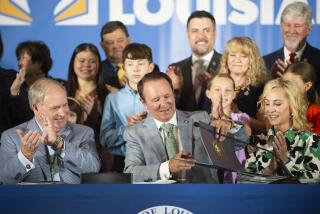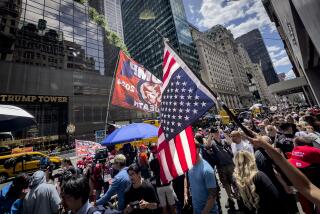Abortion, Executions, Holiday Displays and the Flag : Court Rulings Stir Passion in Religious Groups
- Share via
NEW YORK — A potpourri of reactions has swirled through religious circles to recent Supreme Court decisions on abortion, executions, holiday displays and the flag.
Views were about as mixed in the religious household as in society at large.
One odd situation found Jewish leaders upset because the court had approved displaying a Jewish symbol. Regarding the flag, President Bush ignited conflicting religious reactions by saying he wants new laws to shield it.
Such a constitutional amendment or legislation is needed, said the Knights of Columbus, to remove the court’s inference that burning or otherwise abusing the flag is an “acceptable form of protest.”
The Roman Catholic fraternal order noted its stress on patriotism education in backing measures to “save the flag from desecration.”
Would ‘Exalt’ Flag
On the other hand, the general synod of the United Church of Christ last week said such legislation would “exalt” the flag beyond a “treasured symbol” of America and restrict the very freedom the flag symbolizes.
Similarly, the American Jewish Committee said such legislation would erode the First Amendment that “protects the freedom of all of us,” including “even crazy people who see fit to burn the American flag.”
The court’s upholding of the death penalty for 16- and 17-year-olds and the moderately retarded was denounced by Protestant, Jewish and Roman Catholic leaders.
It is “an outrage” that must be changed, said the Rev. Thom White Wolf Fassett, head of the United Methodist Board of Church and Society. It called the decision “reprehensible” to “people of faith.”
Cardinal ‘Disappointed’
Cardinal Joseph Bernardin of Chicago, terming capital punishment itself a poor way to deter crime, said he is “disappointed and saddened” by the court decision allowing that penalty for minors and the retarded.
The American Jewish Committeesaid it “is appalled” by the decision, adding that capital punishment “degrades and brutalizes” society and becomes a “mockery of justice” in executing the young and retarded.
A total of 30 youths, all younger than 18 when they committed murders, now are on Death Row in various states, and the courts have estimated that about one-fifth of nearly 2,200 others awaiting execution are retarded to some degree.
The abortion decision evoked the most voluminous and diverse reactions, far more sweeping than the decision itself.
Explicitly, it held only that Missouri could prohibit state-based hospitals and personnel from performing abortions. Other aspects remained ambiguous. Previously, Congress itself had barred federal funds for abortion.
Impact Thunderous
Nevertheless, the impact was thunderous on both sides, one denouncing the decision as an assault on women’s rights, and the other saying it signaled a turn toward protecting the unborn.
It is “the beginning of the opportunity to end this dark night of our nation’s soul in which so terribly many of the most defenseless among us, our unborn, have been denied the right to life,” said the Rev. Richard D. Land, head of the Southern Baptist Christian Life Commission.
The decision is “a victory for life” and the biggest winners “are the tiniest people of all--children within the womb,” said Archbishop John L. May of St. Louis, president of the National Conference of Catholic Bishops.
However, some Jewish and Protestant leaders decried the decision as threatening women’s rights.
“The ruling is a deplorable attack on the religious freedom of all Americans,” said officials of the Union of American Hebrew Congregations, vowing to oppose any state attempts to limit free choice in abortion.
Turned Back the Clock
Fassett, the United Methodism’s social-concerns executive, said the court had turned the clock back 20 years on women’s right to choose abortion and the rulings “are highly discriminatory,” putting the heaviest burden on the poor.
However, the Rev. James Heidinger, executive of the denomination’s evangelical caucus, hailed the decision as “a clearly positive one.”
Thus, within denominations, as within the nation, feelings were divided on an issue that remained about as unsettled as ever.
The court’s ruling on religious displays in Pittsburgh, banned a Christmas creche in a courthouse lobby, but approved a Hanukkah menorah on the outside.
Jewish leaders deplored the decision favoring their own symbol, which the court said was acceptable because it was religiously neutral and stood near a secular Christmas tree.
Hastens Transformation
The decision “will further hasten the transformation of Hanukkah from a religious to a cultural event,” lamented Phil Baum, associate director of the American Jewish Congress.
More to Read
Sign up for Essential California
The most important California stories and recommendations in your inbox every morning.
You may occasionally receive promotional content from the Los Angeles Times.













